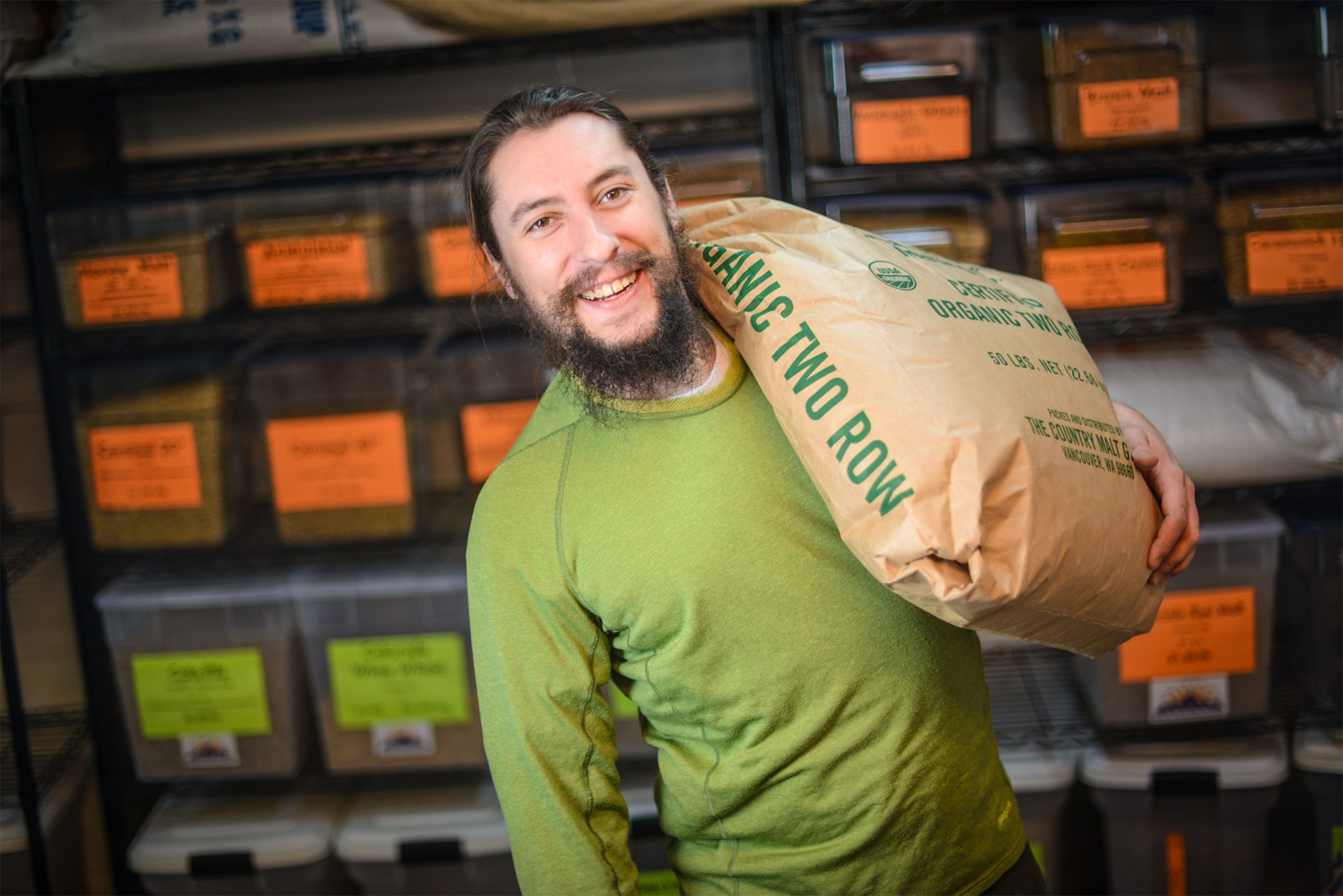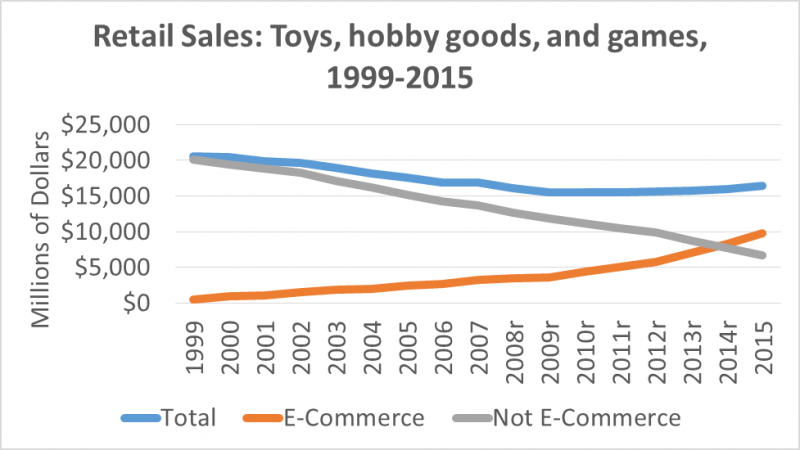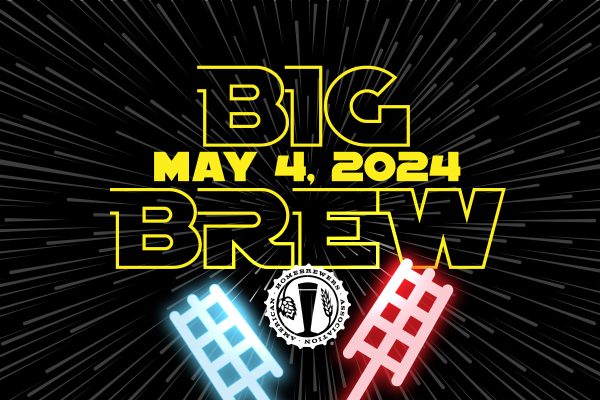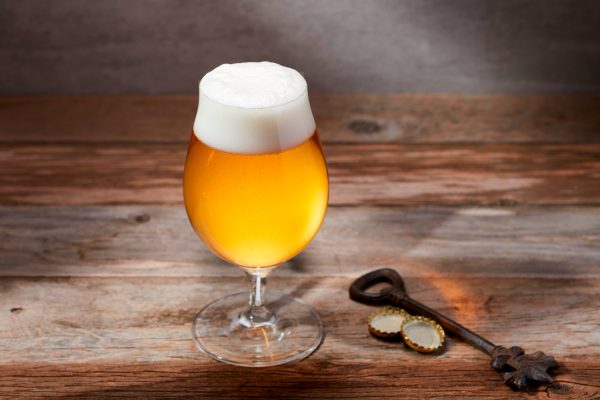
Retail trade is a continuously changing industry. A theory known as the “wheel of retailing” argues that every new dominant retail model is replaced by a newer, more efficient form. New business and technological innovations have brought us the five-and-dime, the self-service market, the big-box store, the category-killer, and now, e-commerce platforms, which are dominated by retail behemoth Amazon. Like Walmart before it, Amazon is reshaping the entire retail landscape and forcing all retailers to rethink where they fall in the market.
Looking at sales data, non–e-commerce sales in real terms remain at roughly the same level they were at a decade ago, which means that retailers who haven’t gotten into e-commerce haven’t seen business grow at all during our recent economic recovery. E-commerce retailers are going the other direction, steadily increasing sales as the number of visitors to their sites and the number of categories they cover increase.
There is still huge variation in how much e-commerce has transformed various product categories. For example, Amazon now has a 13.4 percent share of the baby goods category, but only 0.5 percent in grocery (source: Infoscout, 2017). What is clear is that all categories are slowly but increasingly affected by e-commerce and Amazon. Infoscout found that Amazon shoppers bought on average 31 percent more categories year-over-year in 2017 versus 2016.
Although precise homebrewing statistics are tough to pin down, a comparable industry—toys, hobby goods, and games—has been radically transformed by e-commerce, going from virtually no e-commerce sales to a majority in 15 years.
[REQUEST free Go Brew Yourself informational pamphlets for your homebrew shop or event]
So what are homebrew shop owners to do in a world where the inexorable wheel of retailing increasingly squeezes physical locations? Let’s start by quickly addressing a strategy that is unlikely to work: competing on price or selection alone.
All retailers must pay attention to price, but price competition as a primary strategy is a losing battle against larger competitors that enjoy economies of scale. Similarly, all shops should critically consider their product assortment, but it will be increasingly difficult for any shop to compete on variety of products when competitors have fulfillment centers larger than 20 football fields.

What may work is a business strategy that adds value for your shoppers and differentiates itself on areas that go beyond price and assortment. Here are four broad categories that may work, ranked from least to most differentiated:
- Service & expertise: An obvious first step for any shop. Being the go-to expert for homebrewing equipment knowledge won’t stop customers from price shopping online, but it will build loyalty and give customers another reason to come through the door.
- Convenience: This goes beyond the convenience of being a local store in which customers can get their products now—that advantage disappears in a world in which 24-hour delivery (or sooner) is becoming a reality. More broadly, how can you help your busy consumers save time and make their shopping experiences more convenient? From bundling recipes into ready-to-go packages, creating an area to leave their kids while shopping, or simply thinking about store layout from a convenience perspective, how can your store be a place that is easier to shop than via a smart phone?
- Exclusive Products & Niches: Although a broad assortment is a losing battle in the digital era, physical stores can still compete on selection by finding unique products that resonate with their particular customers. Local ingredients and local beer recipes come to mind on the product side. Bringing in local breweries to talk about brewing is another niche that online can’t fill. What can you put on your shelves that Amazon or another online retailer simply can’t stock in all their warehouses around the country?
- Experiences: This leads to the final, most defensible strategy. How can you move beyond simply selling products and truly offer services that customers want to experience? Can your store compete in the entertainment or lifestyle business as well as it does in homebrewing products? From brewing your own beer that customers can try to hosting workshops or events, these are the types of value additions that are difficult for online retailers to replicate, and they can keep loyal customers coming back. Experiences can could represent an additional revenue stream that makes your store less susceptible to downtowns in product sales.
The digital era and more efficient retailers aren’t going anywhere. But, like previous retailing revolutions, many small shops will survive by focusing on ways they can offer value beyond just price or selection. Walmart killed many local shops, but others thrived based on their expertise and value added to customers. Online homebrew retailing, including Amazon, is a similar challenge, but it’s one that many homebrew retailers will overcome in much the same way.
* * *
Bart Watson, chief economist for the Brewers Association, is a stats geek, a beer lover, and a Certified Cicerone®. He holds a PhD from the University of California, Berkeley, where in addition to his dissertation, he completed a comprehensive survey of Bay Area brewpubs one pint at a time. You can follow him on Twitter @BrewersStats.






Share Post